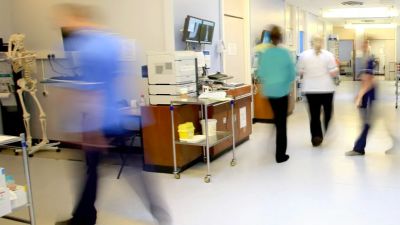England hospital waiting lists hit record high with more than 5m still to start treatment

ITV News Health Editor Emily Morgan has met some of the patients left waiting for treatment
NHS waiting lists are in a "dire state" with over five million people in England waiting for routine hospital treatment - the highest number since records began.
For the first time the statistics show some patients are waiting more than two years for treatment, in the wake of the Covid-19 pandemic.
A total of 5.12 million people were waiting to start treatment at the end of April 2021, according to figures from NHS England.
The number of people having to wait more than a year to start treatment stood at 385,490 in April 2021. This was down from 436,127 in March, but around 35 times the number waiting a year earlier in April 2020 when waiting list numbers stood at 11,042.
Across England, 2,722 people have been waiting two years or more. The most common long waits are for trauma and orthopaedic treatment (516 people) followed by general surgery patients (312), such as gallbladder and hernia operations. Some 246 people were waiting two years or more for Ear, Nose or Throat treatment.
The total number of people admitted for routine treatment in hospitals in England in April 2021 was 223,780 - more than five times the number a year earlier (41,121). This rise does reflect lower-than-usual figures for April 2020, which were affected by the first wave of the Covid-19 pandemic.
The equivalent figure for March 2019, a non-pandemic year, was 280,209.
Listen to Coronavirus: What You Need To Know, the Covid-19 podcast from ITV News
This is the first time since records began in August 2007 that NHS waiting lists have topped five million.
The NHS was forced to put some routine treatments on hold to allow hospitals to cope with an influx of Covid patients where wards were taken over as specialist coronavirus units and staff redeployed.
But while the backlog has been exacerbated the coronavirus pandemic, the service was already under signifiant pressure prior to the first wave.
Mr Tim Mitchell, Vice President of the Royal College of Surgeons of England, said: “Today we have sadly reached the grim milestone in England of more than 5 million people on the NHS hospital waiting list. Really long waits of more than a year, and in some cases more than two years, are particularly troubling.
"These are people waiting for operations like hip and knee replacements, or ear, nose and throat surgery. This is life-changing surgery we’re talking about. Operations that can help people get back to work, that relieve pain and mean people can enjoy a decent quality of life again."
Experts blamed a lack of "preparedness".
Dr Nick Scriven, past president of the Society for Acute Medicine, said "he warning signs about where the NHS was heading were glaringly visible a number of years ago".
“With acute and emergency care under increasing strain and bed occupancy well over safe levels at more than 90% – yet far less impact from Covid at this point – we have major problems.
“We are in a dire state when it comes to record numbers of people waiting for treatment, but we must also remember the four-hour emergency access target has not been met for years now with little to no change in approach," he said,
The Royal College of Surgeons want the government to commit to an additional £1bn for surgery every year for the next five years. It also wants to see the number of beds and doctors increase.
A&E attendances at hospitals in England last month were 65% higher than a year ago, NHS England said. This, again, is a reflection of lower-than-usual numbers for May 2020, which were affected by the Covid-19 pandemic.
A total of 2.08 million attendances were recorded in May 2021, up from 1.26 million in May 2020.
The equivalent figure for May 2019, a non-pandemic year, was 2.17 million.
Covid's tragic legacy: Hospital waiting lists threaten most sick
The Covid pandemic sparked the waiting list surge - but is it all to blame?
NHS England figures also show that a total of 209,452 urgent cancer referrals were made by GPs in England in April 2021, more than double the number in April 2020, which was 80,031.
The equivalent figure for April 2019, a non-pandemic year, was 199,217.
Urgent referrals where breast cancer symptoms were present – though not initially suspected – were up from 3,866 in April 2020 to 14,259 in April 2021.